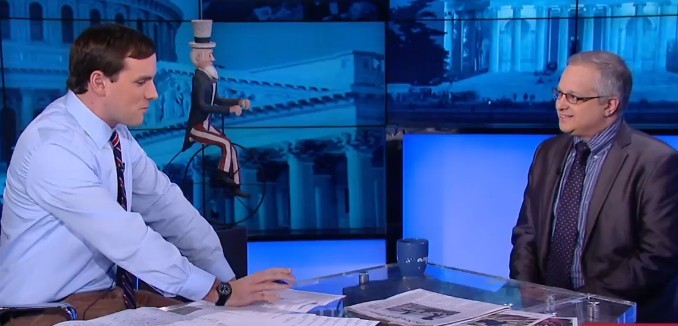America’s Middle Eastern allies are concerned that they “haven’t had their say” in the ongoing nuclear negotiations with Iran, David Hazony, editor of The Tower, told Luke Russert this morning in an interview (embedded below) on The Briefing on MSNBC. Hazony’s argument is that Prime Minister Benjamin Netanyahu won’t just be representing Israel when he speaks before Congress tomorrow morning, but he will be representing America’s allies who are “the ones that stand to lose the most, if one day Iran gets a nuclear weapon.”
Hazony’s response came in answer to Russert’s question: “What is Benjamin Netanyahu stepping into tomorrow?”
Well, first of all, I think we need to step back and look at what’s been going on across the Middle East over the past year. Many countries, allies of the United States have been concerned about the nuclear negotiations with Iran … Saudi Arabia … Egypt. Now every country expresses it their own way and often behind closed doors … but what has unified America’s allies across the region, their traditional allies including Israel, has been a sense that they’ve been left out of the process, out of the negotiations.
They haven’t had their say, and they’re the ones that stand to lose the most, if one day Iran gets a nuclear weapon. So that’s the background going into this speech.
Now there are two very big mischaracterizations, I would say, about what’s going on with the Netanyahu speech:
The first one of these mischaracterizations is the belief that Netanyahu is wrong about what’s going on in the negotiations. That’s what Secretary of State John Kerry has said, that’s what a lot of people in the administration have implied. In the last week or two weeks, there have been revelations about what’s going on in the negotiations that have made a lot of people who are in favor of them to step back and say, “Wait a minute.” This idea of a sunset clause that allows the Iranians in ten years to basically have an on-ramp to a nuclear bomb. So people like Jeffrey Goldberg of the Atlantic, David Horovitz, Editor of the Times of Israel, have suddenly said “Hey , wait a minute, maybe Netanyahu really knows what he’s talking about.”
The second big mischaracterization made is the claim, made mostly by Netanyahu’s opponents in the upcoming election, that Netanyahu’s speech is destroying or harming relations with the U.S. Susan Rice said that just a few days ago “destructive to the fabric of the relationship.” Today there’s a Gallup poll that came out and saying that Netanyahu himself has increased in favorability across America including among Democratic voters – that they like him 6 percent more today than they did three years ago.
When Russert asked if Netanyahu was playing politics with his speech, Hazony responded that “[e]very politician does politics,” and that Netanyahu’s critics were playing politics as much as he is, but that it’s Netanyahu’s job as Prime Minister of Israel “to take every action he can to warn the world against threats to his people.”
Toward the end of the interview Russert asked Hazony about what he calls the Myth of Jewish Centrality and how it relates to current thinking about the Middle East. Hazony responded that one of the interesting trends in current foreign policy thinking is the degree to which so-called “realists” favor detente with Iran. Hazony points out that realists once argued that the United States should look after its interests and listen to the Arab states who have the oil as opposed to Israel. However, nowadays, even though those same Arab states feel as threatened by Iran as Israel does, the realists have thrown them “under the bus.”
Hazony developed the idea of the “Myth of Jewish Centrality” in The Anti-Semitism We Never Talk About, which was published in the February 2015 issue of The Tower Magazine.
[Photo: MSNBC ]




